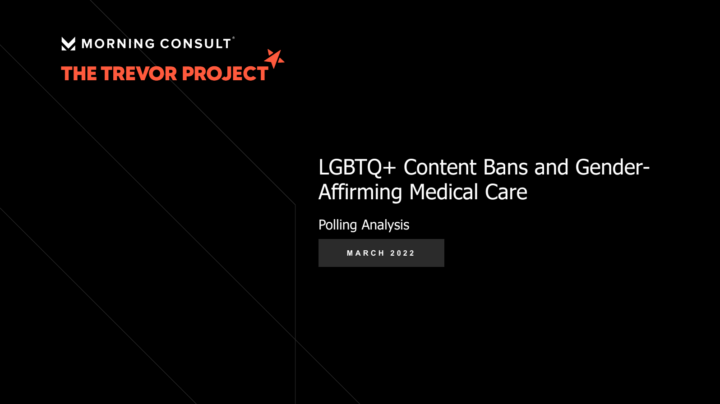The Trevor Project’s third annual National Survey on LGBTQ Youth Mental Health emphasizes the need for greater investment in mental health care and intersectional policy solutions to confront the public health crisis of suicide.
42% of LGBTQ youth, including more than half of transgender and nonbinary youth, seriously considered attempting suicide in the past year. Yet, nearly half could not access the mental health care they desired.
- More than 80% of LGBTQ youth stated that COVID-19 made their living situation more stressful — and only 1 in 3 LGBTQ youth found their home to be LGBTQ-affirming.
- Among LGBTQ respondents, 12% of white youth attempted suicide compared to 31% of Native/Indigenous youth, 21% of Black youth, 21% of multiracial youth, 18% of Latinx youth, and 12% of Asian/Pacific Islander youth.
- Transgender and nonbinary youth attempt suicide less when respect is given to their pronouns and they are allowed to officially change their legal documents.
WASHINGTON, DC — The Trevor Project, the world’s largest suicide prevention and crisis intervention organization for lesbian, gay, bisexual, transgender, queer & questioning (LGBTQ) young people, today released the findings of its 2021 National Survey on LGBTQ Youth Mental Health, representing the experiences of nearly 35,000 LGBTQ youth (ages 13-24) across the United States. The third annual survey finds that 42% of respondents seriously considered attempting suicide in the past year, including more than half of transgender and nonbinary youth. An overwhelming majority of LGBTQ youth also reported recent symptoms of generalized anxiety disorder or major depressive disorder, yet nearly half of respondents reported wanting mental health care in the past year but were not able to get it.
With 45% of respondents being LGBTQ youth of color and 38% being transgender or nonbinary, this survey provides critical insights into suicide risk factors, the impacts of the COVID-19 pandemic, mental health care disparities, discrimination, food insecurity, and conversion therapy. In addition to highlighting these serious challenges, the data underscores the importance of LGBTQ-affirming spaces and practices.
The study also speaks to the potential impacts of current events, with 94% of LGBTQ youth reporting that recent politics negatively impacted their mental health and 70% stating that their mental health was “poor” most of the time or always during COVID-19. Half of all LGBTQ youth of color reported discrimination based on their race/ethnicity in the past year, including 67% of Black LGBTQ youth and 60% of Asian/Pacific Islander LGBTQ youth.
“The past year has been incredibly difficult for so many LGBTQ young people because of multiple crises, from the COVID-19 pandemic to the hostile political climate and repeated acts of racist and transphobic violence. This data makes clear that LGBTQ youth face unique mental health challenges and continue to experience disparities in access to affirming care, family rejection, and discrimination,” said Amit Paley, CEO & Executive Director, The Trevor Project. “We are proud that this survey sample is our most diverse yet, with 45% being LGBTQ youth of color and 38% being transgender or nonbinary. The data speaks to the wide variety of experiences and identities held by LGBTQ youth across the country, and emphasizes the need for comprehensive, intersectional policy solutions to confront systemic barriers and end suicide.”
Across The Trevor Project’s 24/7 crisis services platforms, LGBTQ youth have expressed a wide range of struggles over the last year in response to the COVID-19 pandemic. This study reveals that more than 80% of LGBTQ youth stated that COVID-19 made their living situation more stressful, and only 1 in 3 youth found their home to be LGBTQ-affirming. Further, nearly 40% of LGBTQ youth who had a job reported that they lost it during the pandemic. And 30% of LGBTQ youth reported having trouble affording enough food in the past month, including half of all Native/Indigenous LGBTQ youth and more than 1 in 3 Black and Latinx LGBTQ youth. Historically, both unemployment and food insecurity have been consistent risk factors for suicide.
“The Trevor Project is the largest suicide prevention organization for LGBTQ youth, but even we do not know how many LGBTQ youth die by suicide each year because that data is simply not collected systematically. This third annual survey aims to fill the gaps in the limited research we do have on LGBTQ youth mental health and suicide risk as a means to raise public awareness and improve public health interventions,” said Dr. Amy Green, Vice President of Research, The Trevor Project. “These findings are extremely concerning as they highlight many distinct factors that contribute to LGBTQ youth suicide risk. But we encourage lawmakers, public health officials, and youth-serving organizations to focus on the protective factors illuminated in the data, which point to best practices on how to better support LGBTQ young people. Once again, we find that LGBTQ-affirming spaces and transgender-inclusive policies and practices are consistently associated with lower rates of attempting suicide.”
Survey results demonstrate that respecting transgender and nonbinary youth’s pronouns and allowing them to change their name and/or gender marker on legal documents are associated with lower rates of attempting suicide.
Paley added, “To all the lawmakers considering anti-transgender bills across the county — we urge you to take a hard look at this evidence and take time out of your day to actually meet with the transgender and nonbinary youth who would be harmed by your misguided proposals. Affirming a young person in their gender identity is strongly associated with lower suicide risk. That’s why we should be expanding systems of support and implementing more inclusive policies, not denying trans youth access to affirming spaces and care.”
Additional findings from the survey include:
COVID-19 and economic strain negatively impacted LGBTQ youth’s mental health and sense of self.
The pandemic limited many LGBTQ youth’s ability to express their identity.
- Nearly half of LGBTQ youth stated that COVID-19 impacted their ability to express their sexual orientation.
- Nearly 60% of transgender and nonbinary youth said the pandemic impacted their ability to express their gender identity.
LGBTQ youth who had trouble affording enough food in the past month reported more than twice the rate of attempting suicide in the past year compared to those who did not experience this food insecurity.
- 30% of LGBTQ youth experienced food insecurity in the past month, including half of all Native/Indigenous LGBTQ youth and more than 1 in 3 Black and Latinx LGBTQ youth.
- 27% of LGBTQ youth said they worried that food at home would run out in the last month before they or their family had money to buy more.
- 19% of LGBTQ youth said that in the last month, they were hungry but didn’t eat because they or their family didn’t have enough food.
LGBTQ youth face unique risk factors for suicide, including discrimination and the discredited practice of conversion therapy.
LGBTQ youth who experienced discrimination on the basis of their sexual orientation, gender identity, and/or race/ethnicity reported much higher rates of attempting suicide — and those who reported experiencing all three of these different types of discrimination reported the highest rate of attempting suicide.
- 75% of LGBTQ youth reported that they had experienced discrimination based on their sexual orientation or gender identity at least once in their lifetime, and more than half said they experienced this discrimination in the past year.
- Half of all LGBTQ youth of color reported discrimination based on their race/ethnicity in the past year, including 67% of Black LGBTQ youth and 60% of Asian/Pacific Islander LGBTQ youth.
- 36% of LGBTQ youth who experienced discrimination based on their sexual orientation, gender identity, and race/ethnicity reported attempting suicide, while only 7% of LGBTQ youth who did not experience discrimination reported attempting suicide.
LGBTQ youth who were subjected to conversion therapy reported more than twice the rate of attempting suicide in the past year compared to those who were not.
- 13% of LGBTQ youth reported being subjected to conversion therapy, including 21% of Native/Indigenous LGBTQ youth and 14% of Latinx LGBTQ youth.
- Transgender and nonbinary youth reported being subjected to conversion therapy at twice the rate of cisgender LGBQ youth.
- LGBTQ youth who reported being subjected to conversion therapy were an average of 15 years old at the time, with 83% of LGBTQ youth reporting that it occurred when they were younger than 18.
Affirming spaces and support systems work to save young LGBTQ lives.
Affirming transgender and nonbinary youth by respecting their pronouns and allowing them to change their name and/or gender marker on legal documents is associated with lower rates of attempting suicide.
- Transgender and nonbinary youth who reported having pronouns respected by all of the people they lived with attempted suicide at half the rate of those who did not have their pronouns respected by anyone with whom they lived. However, more than 60% of transgender and nonbinary youth under the age of 18 said that none of the people they lived with respected their pronouns.
- Transgender and nonbinary youth who were able to change their name and/or gender marker on legal documents, such as driver’s licenses and birth certificates, reported lower rates of attempting suicide.
LGBTQ youth who had access to spaces that affirmed their sexual orientation and gender identity consistently reported lower rates of attempting suicide.
- Nearly 7 in 10 LGBTQ youth had access to online spaces that affirmed their sexual orientation and gender identity. Interestingly, an overwhelming majority of LGBTQ youth said that social media has both positive (96%) and negative (88%) impacts on their mental health and well-being.
- Half of all LGBTQ youth said that their school was LGBTQ-affirming.
If you or someone you know is feeling hopeless or suicidal, contact The Trevor Project’s TrevorLifeline 24/7 at 1-866-488-7386. Counseling is also available 24/7 via chat every day at TheTrevorProject.org/Help, or by texting START to 678-678.
Methodology
The content and methodology for The Trevor Project’s 2021 National Survey on LGBTQ Youth Mental Health were approved by an independent Institutional Review Board.
This quantitative cross-sectional survey was conducted using an online platform between October 12, 2020 and December 31, 2020 among 34,759 LGBTQ youth respondents between the ages of 13–24 residing in the United States. Respondents were defined as being LGBTQ if they identified with a sexual orientation other than straight/heterosexual, a gender identity other than cisgender, or both. This report uses “transgender and nonbinary” as an umbrella term to encompass a wide variety of gender identities held by non-cisgender youth. For additional information on methodology such as sample description and comparability, filters and exclusions, question development, and more please visit https://www.TheTrevorProject.org/survey-2021.
###
About The Trevor Project
The Trevor Project is the world’s largest suicide prevention and crisis intervention organization for lesbian, gay, bisexual, transgender, queer & questioning (LGBTQ) young people. The Trevor Project offers a suite of 24/7 crisis intervention and suicide prevention programs, including TrevorLifeline, TrevorText, and TrevorChat as well as the world’s largest safe space social networking site for LGBTQ youth, TrevorSpace. Trevor also operates an education program with resources for youth-serving adults and organizations, an advocacy department fighting for pro-LGBTQ legislation and against anti-LGBTQ rhetoric/policy positions, and a research team to discover the most effective means to help young LGBTQ people in crisis and end suicide. If you or someone you know is feeling hopeless or suicidal, our trained crisis counselors are available 24/7 at 1-866-488-7386 via chat www.TheTrevorProject.org/Get-Help, or by texting START to 678-678.
For media inquiries, please contact:
Rob Todaro
Communications Manager
[email protected]
212-695-8650 x403
For research-related inquiries, please contact:
Amy Green, PhD
Vice President of Research
[email protected]
310.271.8845 x242


